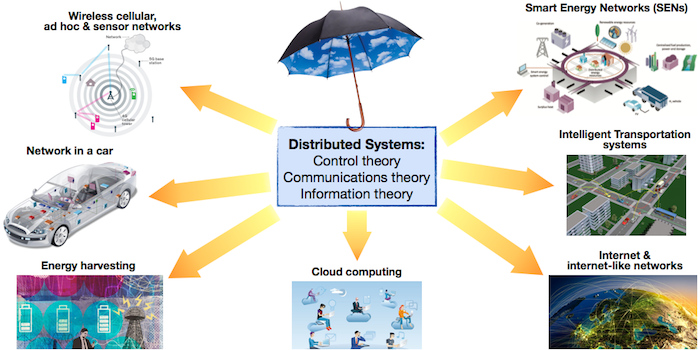Distributed systems
We are now witnessing an explosion in networked systems: everything is connected and massive amounts of devices are required to be coordinated.
Scientific breakthroughs enable new technology whereas at the same time, technology makes it into transformative applications (see, for example, the Internet and wireless communication systems). It is evident that the advancement of smart devices with impressive sensing, computing and control capabilities makes it possible for our cities, transportation systems, factories and living environments to become more intelligent, energy-efficient, safe and secure. We are now witnessing an explosion in networked systems: everything is connected and massive amounts of devices are required to be coordinated. However, the overall system is distributed and a service should be delivered cooperatively, rather than by a unique provider that knows and owns all data. Many researchers and practitioners are interested in understanding the complexity and possible solution approaches, since distributed systems apply to different areas and applications and are anticipated to play a central role in the near future.
In applications that can be characterized as distributed systems, dynamical systems are controlled or communicate and interact with other dynamical systems via a network of sensors and actuators transmitting and receiving information over a digital communication network. Real communication channels suffer from various problems (such as limited capacity, bit errors, erasures and random delays) that can affect the stability and/or performance of the whole system. Given the multidisciplinary nature of distributed systems, many studies are necessarily restricted to contributions that solve problems partially, ignoring important aspects of such systems due to modular approaches to the problem. In order to be able to deal with distributed systems, we need to better understand information, and the interplay between information and decisions. However, communication and control/decision making have traditionally been treated separately whereas recent emerging applications necessitate a more holistic approach, since communication and control are no longer independent.
The main objective of this line or research is to develop the framework on how to treat the interplay between communications and control to solve distributed control and optimization problems arising in distributed systems and in Cyber-Physical Systems (CPS), in general.
The group is led by Professor Themistoklis.Charalambous [at] aalto [dot] fi (Themistoklis Charalambous)



